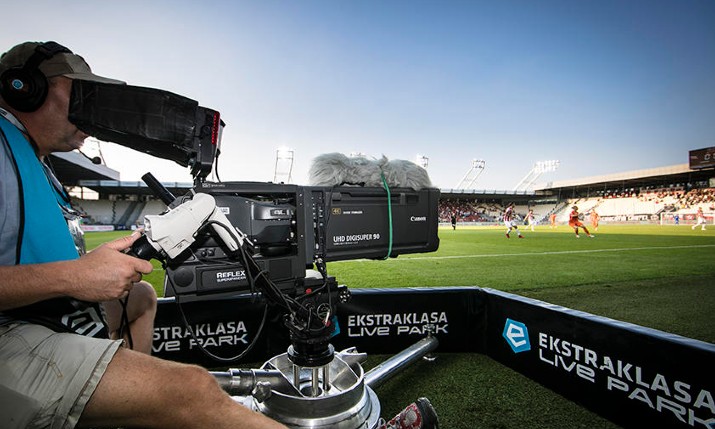Ekstraklasa announces Polish fans to return to stadiums from 19 June after successful restart
Ekstraklasa Live Park says mission accomplished on first live match broadcasts

Photo credit: Szymon Wramba.
Ekstraklasa has stated that Polish football fans are set to return to stadiums to watch live matches from 19 June, following the league’s resumption on Friday 29 May.
The number of fans allowed into each stadium will depend on the capacity of each particular venue, although the maximum has been announced as 25% in order to allow for safe social distancing.
Speaking to SVG Europe, Marcin Serafin, chief operating officer at Ekstraklasa Live Park, summed up what the return to live football has meant for the league, for its fans, and for broadcasters: “This was a very important weekend for the league, fans, broadcasters, and for us – Live Park. Finally football is back, and we’re finally returning to normal life. Players are doing what they love most; playing football.
“Broadcasters showed all eight matches [this last weekend] and filled their programming schedule, we were able to come back to work, and fans at last could watch live matches on TV,” continued Serafin.
On the ability for fans to start attending matches, Serfin said: “As for the fans – only temporarily – beginning on 19 June, some of them can start coming back to the stadiums. New government regulations allow for stadiums to be at 25% capacity. That’s a huge deal, also for the clubs. Real fans in the stands, and additional revenue, [are the] two elements which essentially every club in the world is missing at the moment.”
As to how the broadcasting of the first three days of live matches in Poland went for Ekstraklasa Live Park, Serafin stated: “From our perspective everything went according to plan. Very strict sanitary regulations were adhered to by every member of the production team. Working in masks and gloves – which previously looked like an inconvenience – wasn’t a problem for anyone. Mission accomplished. We’re looking forward the next matches.”
The news that fans were able to attend matches was announced at a press conference held at the National Stadium in Warsaw with the participation of Prime Minister Mateusz Morawiecki, Minister of Sport Danuta Dmowska-Andrzejuk, president of Ekstraklasa Marcin Animucki, and president of the Polish Football Association, Zbigniew Boniek.
Said Prime Minister Morawiecki: “We all need football and sport. This is the important element of our return to the new normality. That’s why we give the opportunity to football fans to participate in the events at the stadiums, of course only after securing adequate safety measures. The specific rules will be announced soon.”
The league competition in Poland, PKO Bank Polski Ekstraklasa, restarted on 29 May after 82 days of lockdown caused by the COVID-19 pandemic. Fans in Poland can watch matches on CANAL+ and TVP, Polish Television, until the end of the main round. Polish Radio is broadcasting select matches.
Meanwhile, for fans outside of Poland, Ekstraklasa has sold broadcasting rights to several overseas broadcasters. Fans are able to watch matches all around the world – except in Poland and seven Balkan countries with the exclusive license rights – also via the Ekstraklasa.tv over the top (OTT) platform.
Animucki added: “We are very pleased that the hard work of plenty people in previous weeks was rewarded and we can restart the league today. All the players were tested for COVID-19 and their results were negative. We are well prepared for the return. The people that will come to the stadiums will be secure. It will be an excellent time for the promotion of Polish football in Europe.”
The restart of PKO Bank Polski Ekstraklasa was possible thanks to the cooperation between Ekstraklasa, the Polish Football Association and the state authorities in Poland. Several dozen people worked on the medical protocol that allowed the return of the games. The work was supervised by Professor Krzysztof Pawlaczyk.
